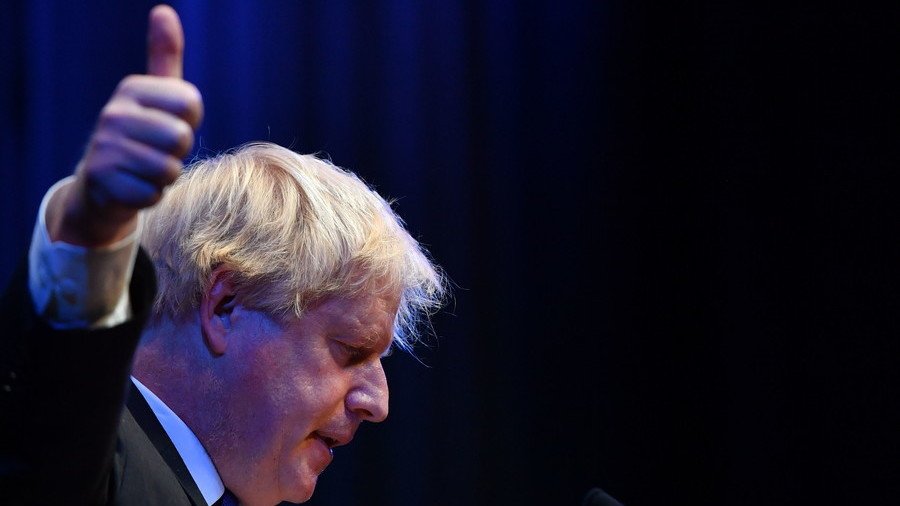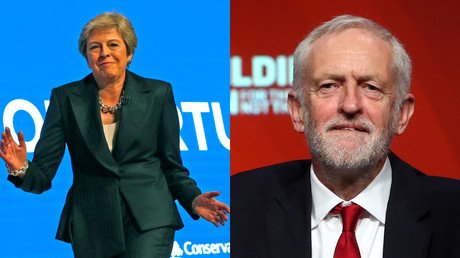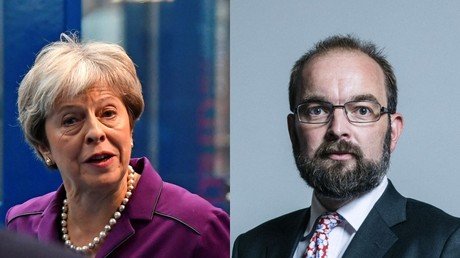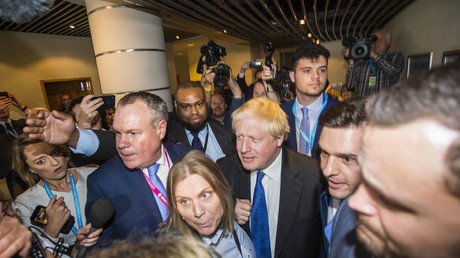Is Boris Johnson UK’s next prime minister? – Ken Livingstone

The last week’s news in Britain was dominated by the Conservative Party annual conference. Theresa May, the weakest PM in my memory, managed to stumble through the conference and, if anything, slightly strengthened her position.
There is constant speculation that she may be forced to resign in a few weeks or months and no-one expects her to lead the Tories into the next general election. Her insecure position has been caused by the long, dragged out agonising over what terms will be required for us to leave the European Union.
It’s been over two years since British voters narrowly decided we should leave the EU but there is still only the vaguest so-called Chequers plan about the terms on which we will leave and the EU has made it absolutely clear that this is not an adequate proposal. The negotiations for our leaving the EU have to be competed in just over five to six weeks in order to meet the Brexit deadline, but no-one knows what parliament is likely to do when the final deal is presented to them to vote on.
The Tory party is deeply divided between those who want to stay in the customs union and those who just want to completely walk away without a deal. A similar division exists amongst Labour MPs, though far fewer want a hard Brexit.
All this insecurity has given our former foreign secretary and ex-London mayor, Boris Johnson, the platform on which to organise his bid to become prime minister. Since he resigned from May’s cabinet in protest at the Chequers deal he has been earning over a quarter of a million pounds for writing a weekly column in the Daily Telegraph which he has used consistently to criticise the prime minister and boost his own standing as the most likely successor.
On September 9, he claimed “We have wrapped a suicide vest around the British constitution and handed the detonator to Michel Barnier.” Eighty hard-line Brexiteer Tory MPs have formed the European Research Group which they are using to organise bringing down the prime minister, with most of them wanting to see Johnson replacing her. Their problem is Johnson is very unpopular among many Tory MPs. The majority of them voted to remain in the EU during the referendum and one anonymously told the press “It’s a hundred percent inconceivable that he’ll become leader of the Conservative party… he’s a media clown not a serious politician.” Another anonymous MP said “He’s a sh*t who doesn’t give a sh*t about anything but himself.”
These views do not reflect public opinion. A recent YouGov poll discovered that Johnson beats May on the question of who is most liked by 36 percent to 29 percent. The poll showed that amongst Tory voters he is on a par with Mrs May about being liked.
Amongst the Tory party membership however, Johnson is more popular and it is they who get to chose the next leader. A poll on the Conservative Home website showed that in a leadership election, 35 percent of Tory members support Johnson with the home secretary in second place with just 15 percent. Johnson’s numbers have been going up with Jacob Rees-Mogg running at just ten percent and Michael Gove at six percent.
Johnson’s biggest problem is that whilst Tory party members get the vote to decide who should be the next Tory leader, it is Tory MPs who decide which two candidates should be put up for the membership to choose between. Surprisingly, the announcement that he is about to divorce his wife has done no damage to his standing according to the polls.
Back in 2016, when David Cameron resigned as prime minister he withdrew from contesting the leadership and May was elected unopposed. The former cabinet minister Andrew Mitchell, who supported Johnson’s leadership bid in 2016, told The Observer newspaper “Most colleagues will be sympathetic and supportive at what is a difficult time for him. I very much doubt that this will have much impact on his leadership chances”. Another Tory MP anonymously told the paper: “There is a lot of sympathy. There is no reason why someone who has gone through a divorce cannot go on to be prime minister and this probably applies to Boris more than anyone.”
At the elections in 2008 and 2012 Johnson defeated me to become mayor of London. When he first announced he was standing I and my staff poured over fifteen years’ worth of Johnsons’ articles and checked his voting record. His writing was deeply reactionary on all issues with the sole exception of immigration. He had voted against the minimum wage, wanted new nuclear weapons and had the five hundred and sixty seventh lowest voting record in the House of Commons. He always supported fox hunting and claimed that global warming was “a new stone age religion.” His stance on Muslims has been controversial, following his suggestion that we should forbid Imams from preaching sermons in anything but English which he claimed was multicultural apartheid. He was virtually the most enthusiastic cheerleader for the invasion of Iraq.
Johnson’s biographer, Andrew Gimson’s book is so funny that I read it twice. It reveals that his teacher, Martin Hammond, wrote to Johnson’s father warning “Boris really has adopted a disgracefully cavalier attitude to his classical studies… he honestly believes that it is churlish of us not to regard him as an exception, one who should be free of the network of obligations that binds everyone else.” Hammond’s report on Boris in July 1982 stated “Boris is pretty impressive when success can be achieved by pure intelligence unaccompanied by hard work… Boris has something of a tendency to assume that success and honours to drop into his lap.”
On his arrival at Oxford University Johnson wrote a long essay in which he claimed that to win elections required a “deluded collection of stooges…[who] believed you will do a lot for them, but the brutal fact is that stooges will do more for the candidate… The terrible art of the candidate is to coddle to the self-deception of the stooge.”
As there was no chance of a Conservative being elected to the Oxford Union Johnson claimed to be a member of the Social Democratic Party but following his win of the presidency he reverted to being a Tory.
Gimson says “Boris pretends to be old-fashioned, partly in order to hide the fact that he really is old-fashioned. He most likely believes laundry is for women but would never be foolish enough to say it.” After leaving Oxford Johnson got a job on The Times but was sacked by the editor for inventing a quote in an article he wrote. He then got a job working for Max Hastings, editor of the Daily Telegraph, who sent him to Brussels to report on the EU. Gimson quotes a fellow reporter saying “He made stories up including that the EU headquarters was to be blown up because it contained asbestos. It still stands there today.”
What transformed Johnson’s perception by the public was his frequent appearance on the TV programme Have I Got News For You, where the audience loved his humour and this was most probably the biggest factor in his winning the mayoral election in 2008.
The worse legacy of Johnson’s eight years a mayor was his failure to act to reduce the lethal levels of pollution from vehicles in London’s atmosphere. Just before I lost the election I had introduced a Low Emission Zone which had introduced hefty charges for polluting heavy goods vehicles and the first set of charges on polluting cars was due to come in just after the election in May 2008. Johnson cancelled that and over the next eight years did nothing. During that period seventy-six thousand Londoners died prematurely because of the pollution. He increased bus fares by two percent above inflation every year, cut the number of police by 1,700 and slashed investment in transport by three and a half billion pounds.
I had found the job of being mayor truly wonderful because you could do so much but during Johnson’s eight years, his only legacy was to build the notorious cable car to nowhere and a revolving restaurant on the Olympic site.
Before Tory MPs decide to allow Johnson to stand for leader they should talk to his former employer Max Hastings who wrote in the Daily Mail: “Boris is a gold medal egomaniac. I would not trust him with my wife, nor from painful experience, my wallet… He is not a man to believe in, to trust or respect, safe as a superlative exhibitionist. He is bereft of judgement, loyalty and discretion. Only in the star grazed, frivolous Britain of the 21st century could such a man risen to high and he is utterly unfit to go higher still.”
Like this story? Share it with a friend!
The statements, views and opinions expressed in this column are solely those of the author and do not necessarily represent those of RT.

















